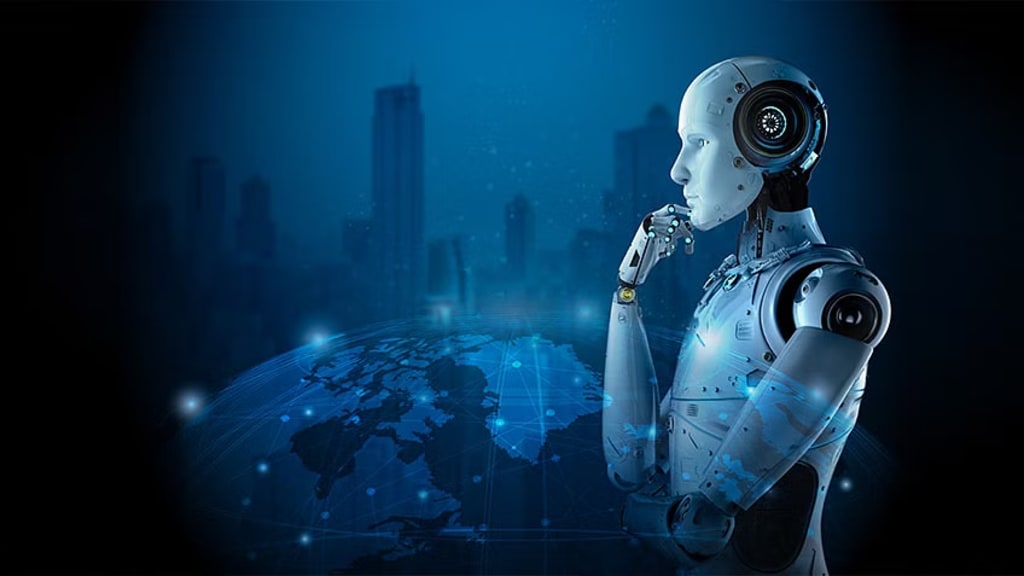
Artificial intelligence:
Artificial intelligence (AI) is the simulation of human intelligence processes by computer systems.
These processes include learning (the acquisition of information and rules for using the information), reasoning (using the rules to reach approximate or definite conclusions), and self-correction.
AI technology has advanced significantly in recent years and is being used in a variety of industries, including healthcare, finance, and transportation. Some examples of AI applications include virtual personal assistants, image and speech recognition, and autonomous vehicles.
Origin of AI:
The origins of artificial intelligence can be traced back to ancient history, with stories of automatons and self-operating machines in Greek mythology. However, the modern field of AI as we know it today began to take shape in the 1950s.
In 1950, Alan Turing published a paper titled "Computing Machinery and Intelligence," in which he proposed the Turing Test as a way to determine a machine's ability to exhibit intelligent behavior that is indistinguishable from that of a human.
In 1956, a group of researchers including John McCarthy, Marvin Minsky, Nathaniel Rochester, and Claude Shannon proposed the Dartmouth Conference, which is considered to be the birth of AI as a field of study. They coined the term "Artificial Intelligence" and defined it as "the science and engineering of making intelligent machines."
In the following years, AI research and development have been carried out by scientists, engineers, and researchers from various institutions, companies and organizations around the world. The field has grown and evolved significantly since then, with advances in areas such as machine learning, natural language processing, and computer vision leading to a wide range of practical applications for AI.
Founder of AI:
The field of artificial intelligence has a long history and many contributors. Some of the earliest work in AI was done by researchers such as Alan Turing, Warren McCulloch, and Walter Pitts in the 1940s and 1950s.
In the 1950s and 1960s, John McCarthy, Marvin Minsky, Nathaniel Rochester, and Claude Shannon at Dartmouth College proposed the Dartmouth Conference which is considered to be the birth of AI as a field of study.
They coined the term "Artificial Intelligence" and defined it as "the science and engineering of making intelligent machines." In the following years, AI research and development have been carried out by scientists, engineers, and researchers from various institutions, companies and organizations around the world.
Advantages of AI:
There are many advantages of artificial intelligence (AI), including:
- Efficiency: AI systems can process large amounts of data quickly and accurately, making them more efficient than humans in many tasks.
- 24/7 Availability: AI systems can work around the clock without getting tired, which can increase productivity.
- Improved Accuracy: AI systems can be trained to identify patterns and make predictions with high accuracy, which can lead to improved decision-making.
- Automation: AI can automate repetitive and time-consuming tasks, which can free up human workers to focus on more complex and creative tasks.
- Personalization: AI can be used to personalize products and services, such as recommending movies or books based on a user's preferences.
- Cost-effective: The cost of AI is decreasing, which makes it accessible to more businesses and individuals.
- Predictive Maintenance: AI can be used to predict when equipment or machines will fail, which can improve maintenance and reduce downtime
- Improved Safety: AI can be used to improve safety in areas such as transportation and healthcare.
- Intelligent Automation: AI can be used in automating complex tasks that require human-like intelligence, such as understanding natural language, recognizing images, and making decisions.
- Scalability: AI systems can be easily scaled to handle increasing amounts of data, which makes them suitable for big data and internet of things applications.
Disadvantages of AI:
There are also some potential disadvantages of artificial intelligence (AI), including:
- Job Loss: As AI systems automate tasks that were previously done by humans, there is a risk of job loss, particularly in industries where labor is replaced by automation.
- Bias: AI systems can perpetuate and even amplify existing biases in the data used to train them, which can lead to unfair or discriminatory decisions.
- Lack of transparency: Some AI systems, particularly those based on deep learning, can be difficult to understand and interpret, which can make it hard to explain their decisions and actions.
- Dependence: As we rely more and more on AI systems, there is a risk of becoming too dependent on them, which can make us vulnerable if the systems fail or are compromised.
- Cybersecurity: AI systems are vulnerable to hacking, malware, and other cyber threats, which can lead to data breaches and other security issues.
- Privacy concerns: AI systems can collect and store large amounts of personal data, which can raise privacy concerns and potential misuse of that data.
- Lack of accountability: As AI systems make decisions and take actions autonomously, it can be difficult to assign accountability if something goes wrong.
- High cost: The development and maintenance of AI systems can be expensive, which can make it difficult for small businesses and individuals to afford them.
- Misuse: AI systems can be used for malicious purposes, such as creating deep fakes, spreading disinformation, and automating cyber attacks.
- Lack of Empathy: AI systems can lack empathy and understanding of human emotions, which can make them less effective in certain situations such as customer service, mental health care, etc.
How AI helps students:
Artificial intelligence (AI) can help students in a variety of ways, including:
- Personalized Learning: AI can be used to create personalized learning experiences for students, by analyzing their performance and providing customized instruction and feedback.
- Adaptive Testing: AI can be used to create adaptive tests that adjust to a student's level of understanding, providing a more accurate assessment of their knowledge.
- Tutoring: AI-powered tutoring systems can provide individualized instruction and feedback to help students improve their understanding of difficult concepts.
- Language Learning: AI-powered language learning systems can provide personalized instruction and feedback to help students improve their language skills.
- Predictive Analytics: AI can be used to analyze student data and make predictions about future performance, which can help identify students who may be at risk of falling behind and provide early intervention.
- Automated Grading: AI can be used to grade student work, such as essays, providing feedback and speeding up the grading process.
- Intelligent Tutoring System: AI-powered intelligent tutoring systems can provide real-time feedback and guidance to students, allowing them to learn at their own pace.
- Virtual Reality: AI-powered virtual reality systems can be used to create immersive learning experiences for students, allowing them to explore and interact with complex concepts in a virtual environment.
- Chatbots: AI-powered chatbots can provide students with instant feedback and support, answering their questions and helping them with their work.
- Learning Management System: AI-powered Learning Management Systems can provide real-time analytics and insights to the teachers, helping them to improve the curriculum and teaching methods.
Feature hope for AI:
There are many exciting developments and advancements in the field of artificial intelligence (AI) that offer hope for the future. Some of these include:
- Advancements in Machine Learning: New techniques and algorithms in machine learning, such as deep learning, are allowing AI systems to become more accurate and efficient in tasks such as image and speech recognition.
- Natural Language Processing: AI systems are becoming increasingly proficient at understanding and generating human language, which has the potential to improve communication and make it easier for people to interact with computers.
- Computer Vision: AI systems are becoming increasingly adept at understanding and interpreting visual information, which can be used in applications such as autonomous vehicles and medical image analysis.
- Robotics: AI is being used to improve the capabilities of robots and make them more versatile and useful in a variety of fields, including manufacturing, healthcare, and logistics.
- Healthcare: AI is being used to improve the diagnosis and treatment of diseases, as well as to analyze medical data and improve our understanding of human health.
- Climate change: AI is being used to help reduce the impact of climate change, such as optimizing energy use, reducing emissions, and forecasting the weather, which can help us to be better prepared for extreme weather events.
- Self-driving cars: AI is being used to develop autonomous vehicles that can drive themselves, which has the potential to reduce accidents, improve transportation efficiency, and make transportation more accessible to people who are unable to drive.
- Virtual and Augmented Reality: AI is being used to create more realistic and immersive virtual and augmented reality experiences, which can be used for entertainment, education, and training.
- Assistive technology: AI is being used to develop assistive technology for people with disabilities, such as speech recognition and text-to-speech systems, which can help them to communicate and participate more fully in society.
- AI Ethics: AI also has a growing importance in the ethical implications and governance of the technology, which could help to ensure that AI systems are developed and used in ways that are safe, fair, and beneficial for society.
Monthly income after completing the AI course:
The monthly income of a professional with an AI course completion varies based on factors such as the individual's skills and experience, the location and type of employer, and the specific role and responsibilities.
An AI Engineer, Machine Learning Engineer, Data Scientist, Research Scientist, and similar roles are some of the most in-demand roles in the field of AI. According to Glassdoor, the average salary for an AI Engineer is around $126,830 per year, or about $10,569 per month. Similarly, Machine Learning Engineer's average salary is around $126,830 per year, and Data Scientist's average salary is around $118,709 per year.
However, it's important to note that salaries can vary significantly based on location, company size, and industry. In some cases, professionals with AI skills can earn much higher salaries, especially if they have several years of experience or hold a leadership role in a large company.
Also, It's worth noting that the demand for AI talent is high and it's expected to continue to grow, so the job market and salary potential for those with AI skills are likely to be good in the coming years.






Comments (1)
Thank you sir for the good information